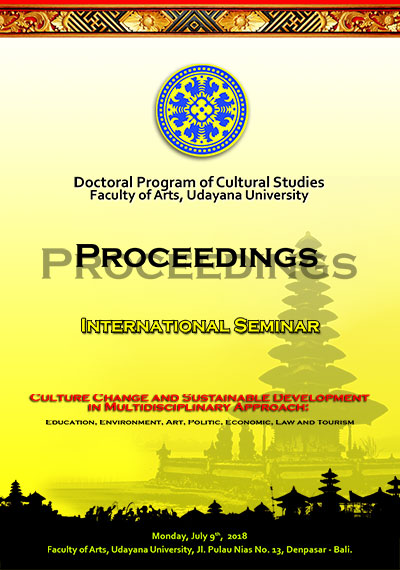MANAGING POTENTIAL CONFLICTS AND MAINTAINING TOLERANCE OF INTER-RELIGIOUS RELATIONS IN MULTI-RELIGIOUS COMMUNITIES
CASE STUDIES OF EKASARI VILLAGE, JEMBERANA DISTRICT, BALI PROVINCE
Abstract
Globalization becomes the hegemonic power of the vast transformation of the world's life of the nation state in the world which leads to the homogenization of Western culture on the one hand and local cultural resistance based on ethnic, religious and racial on the other side The national policy of autonomy which is expected to overcome the problem of ethnicity and multiculturalism in Indonesia, turned into a hyperotonom based on primordialism so as to bring up ethnic an religious prejudices. This condition is then a factor the rise of cases of social conflict in several regions in Indonesia. Indeed social disharmony or such conflicts can occur at any time and between groups, therefore tolerance and harmony of inter-ethnic and religious relationships in a multi-faith community need to be developed continuously. Because interreligious tolerance and multiculturalism is not something given, but takes place in social construction. The purpose of this research is to understand how the multi-religious and multicultural peoples of Ekasari village managing potential conflicts and maintaining tolerance of interreligious relationships in their daily lives. This study used critical ethnography approach. The data was analyzed qualitatively. The study found that the strategy used to manage the potential conflicts between people in Ekasari village by applying the priciple of equality, participation, legetimate, and multiculturalism. Maintaining the harmony and tolerance of interreligious relationships by applying the concpt of penyama-berayaan and pesilih-asihan base on the value of Tri Hita Karana and the historical experience of the formation of Ekasari village by their ancestors.
Downloads
References
Berger-Schmitt. 2000. Social Cohesion as an Aspect of the Quality of Societies: Concept and Measurement. EuReporting Working Paper No 14.
Hardestry, Richard W. 1977. Ecological Anthropology. New York: John Wiley & Suns.
Hidayat, Komaruddin. 2008. The Wisdom of Life Menjawab Kegelisahan Hidup dan Agama. Jakarta: Penerbit Buku Kompas.
Liliweri, Alo.2005. Prasangka dan Konflik, Komunikasi Lintas Budaya Masyarakat Multikultur. Yogyakarta: LkiS.
Majid, Nurcholis. 1994. Indonesia: Sebuah Contoh Pluralisme dan Toleransi Agama. Jakarta: Dharma Santi Nyepi Tingkat Nasional.
Medison, Sayoni, D. Critical Ethnography, Method, Ethics and Performance. (2012), Los Angeles, London, New Delhi, Singapore, Washington DC: Sage Publication, Ins, (pp.1-41).
Miles & Huberman.A. 1992. Analisis Data Kualitatif. Jakarta: Universitas Indonesia. Prekh, Bhiku. 2007. Rethinking Multikulturalism Keberagaman Budaya dan Teori Politik. Yogyakarta: Kanisius.
Ritzen et al. 2000. “Good” Politicians and “Bad” Policies: Social Cohesion, Institutions and Growth. World Bank. Jo Ritzen,William Easterly, dan Michael Woolcock (September) Policy Research Working Paper 2448.
Siddique, Sharon, 2001. “Social Cohesion and Social Conflict in Southeast Asia” dalam “Social Cohesion and Conflict Prevention in Asia: Managing Diversity through Development” Washington D.C.: The World Bank.
Soekanto, Soerjono. 2004. Sosiologi: Suatu Pengantar. Jakarta: PT. Raja Grafindo Persada. Tilaar, H.A.R.2004. Multikulturalisme Tantangan-tantangan Global Masa Depan dalam Transformasi Pendidikan Nasional. Jakarta: Grasindo.

This work is licensed under a Creative Commons Attribution-NonCommercial-ShareAlike 4.0 International License.





